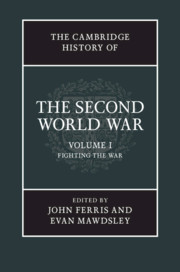Book contents
- The Cambridge History of The Second World War
- The Cambridge History of the Second World War
- The Cambridge History of The Second World War
- Copyright page
- Contents
- Illustrations
- Figures
- Maps
- Tables
- Contributors to Volume I
- General introduction
- Introduction to Volume I
- Part I Grand Strategies
- Part II Campaigns
- Introduction to Part II
- 9 Campaigns in China, 1937–1945
- 10 The war in the West, 1939–1940
- 11 The war in the West, 1939–1940
- 12 Operations on the Eastern Front, 1941–1945
- 13 The Mediterranean and North Africa, 1940–1944
- 14 The war in the West, 1943–1945
- 15 The war in the Pacific, 1941–1945
- 16 The Atlantic war, 1939–1945
- 17 Anglo-American strategic bombing, 1940–1945
- Part III Fighting Forces
- Bibliographical essays
- Index
- Plate Section (PDF Only)
13 - The Mediterranean and North Africa, 1940–1944
from Part II - Campaigns
Published online by Cambridge University Press: 05 June 2015
- The Cambridge History of The Second World War
- The Cambridge History of the Second World War
- The Cambridge History of The Second World War
- Copyright page
- Contents
- Illustrations
- Figures
- Maps
- Tables
- Contributors to Volume I
- General introduction
- Introduction to Volume I
- Part I Grand Strategies
- Part II Campaigns
- Introduction to Part II
- 9 Campaigns in China, 1937–1945
- 10 The war in the West, 1939–1940
- 11 The war in the West, 1939–1940
- 12 Operations on the Eastern Front, 1941–1945
- 13 The Mediterranean and North Africa, 1940–1944
- 14 The war in the West, 1943–1945
- 15 The war in the Pacific, 1941–1945
- 16 The Atlantic war, 1939–1945
- 17 Anglo-American strategic bombing, 1940–1945
- Part III Fighting Forces
- Bibliographical essays
- Index
- Plate Section (PDF Only)
Summary
- Type
- Chapter
- Information
- The Cambridge History of the Second World War , pp. 358 - 388Publisher: Cambridge University PressPrint publication year: 2015
- 2
- Cited by

